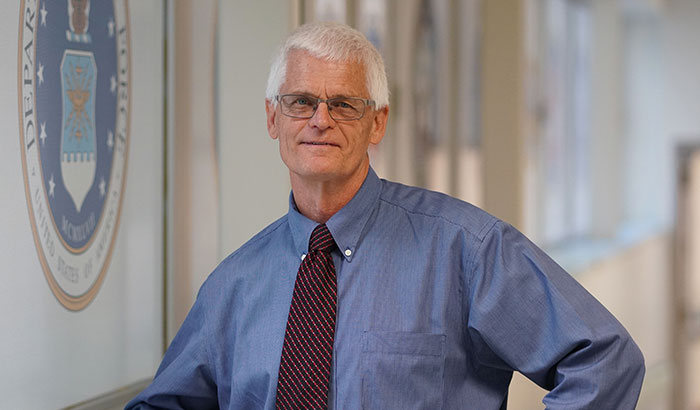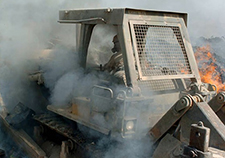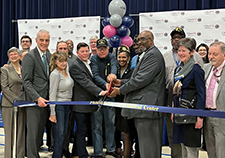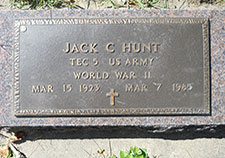Office of Research & Development |
 |


Dr. Stephen Hunt is an occupational and environmental medicine physician in primary and post-deployment care at the VA Puget Sound Health Care System. (Photo by Christopher Pacheco)
July 19, 2018
By Mike Richman
VA Research Communications
Dr. Stephen Hunt goes about his work with a special thought in mind. An accomplished VA clinician and researcher, he thinks about the connections he has with Veterans, both in his personal life and his professional endeavors.
His VA career of nearly four decades has largely been in honor of his father, who fought in World War II, as well as three young men who were killed in the Vietnam War and were older brothers of his friends. It would be a “rare day,” he says, that he doesn’t think about his father, about his friends’ brothers who died in Vietnam, or about all of the people whose names are etched on the Vietnam Veterans Memorial wall in Washington, D.C.
"For people working in VA, this is one of our joys, taking at least a few minutes to connect with every Veteran as a Veteran..."
At the same time, he tries to extend the same deep respect and appreciation to each of the thousands of Veterans he’s treated.
“Each one of those Veterans has had a very important personal story related to his or her service,” says Hunt, who is not a Veteran. “For people working in VA, this is one of our joys, taking at least a few minutes to connect with every Veteran as a Veteran, finding out what branch they were in, when they served, and whether they deployed. Reminding them perhaps that 'it’s amazing that you were doing that at that age.’ It enriches our work experience to even learn a little bit about what serving means to each Veteran that we see and to understand how serving affected their life. This informs our care and makes us better providers. It also gives us a more meaningful connection with the Veterans we’re working with. What could be more important than that not only for us as clinicians, but for us as a society, too?”
In the vast community of VA professionals, Hunt sees people all around him with the same admiration and respect for those who have served.
“That’s a very special thing about VA,” he says. “It’s a system in which we are immersed in this world of people who have served, people who have sacrificed.”

VA Study Documents Health Risks for Burn Pit Exposures

AI to Maximize Treatment for Veterans with Head and Neck Cancer

VA opens new research center to seek novel arthritis treatments
Hunt is an occupational and environmental medicine (OEM) physician in primary care and post-deployment care at the VA Puget Sound Health Care System in Seattle. He treats combat Veterans who fought in Vietnam, the Gulf War, and in the post-9-11 conflicts in Iraq and Afghanistan. He also mentors primary care and OEM residents who are learning how to take care of Veterans in the Center of Excellence in Primary Care Education (CoEPCE) at the Puget Sound VA, one of seven VA medical centers with a CoEPCE.
Hunt has been at the forefront of developing approaches to more effectively address the complex health care needs and life changes that often surface for service members returning from combat deployment. Many of those Veterans are battling musculoskeletal injuries, mental health conditions like PTSD, or cognitive deficits stemming from traumatic brain injuries, among other physical and psychological challenges.
Case in point: He helped launch VA’s Post-Deployment Integrated Care Initiative (PDICI) in 2008 and is now its national director. The program has provided a structured and integrated approach to caring for returning combat Veterans, building on the lessons learned from VA often ineffectively addressing the needs of Veterans who served in the Vietnam War and the Gulf War, he says.
He believes PDICI speaks to how VA has corrected its mistakes and shortcomings of the past.
“Sometimes even in VA, we have forgotten that our main mission is to take care of people coming back from war,” he says. “That mission is chiseled on the outside of the VA headquarters building in Washington, D.C. In the past, when wars have broken out, we have found ourselves time and time again scrambling around without a systematic way of effectively supporting people coming back from combat. Now we understand what’s needed to support people coming home from war. It’s incumbent upon us when the next conflict occurs to ensure, not only in VA but also as a nation, that our Veterans receive the timely, effective, and ongoing post-deployment care they will need and deserve.”
PDICI’s mission starts with an expression of appreciation for the Veteran's service, an acknowledgment of the sacrifices the Veteran and his or her family have faced, and attentiveness to the Veteran's story.
PDICI teams, which normally include physicians, mental health specialists, and social workers, conduct assessments of physical, mental, and psychosocial functioning of Vets through a primary care, team-based approach to treatment. This type of system has served as a model for VA's Patient Aligned Care Teams (PACT), which involves each Veteran working with a team of health care professionals to create a plan for life-long health and wellness that corresponds with VA’s Whole Health System.
“Military service and deployments, particularly combat deployments, expose military personnel to health risks that can impact physical health, psychological, emotional, and spiritual health, and interpersonal social functioning,” says Hunt, who is also an associate professor at the University of Washington. “These Veterans may have a host of health conditions and impairments in any or all of these realms. To make the adjustment from military life to civilian life, and to recover optimal health, requires integrated, team-based care. That’s what we’re trying to do with PDICI, PACT, Primary Care – Mental Health Integration, and other VA programs.”
Following the 2008 PDICI implementation, a VA study found that by 2010 nearly 84 percent of VA medical centers had integrated post-deployment care capabilities.
“Eighty-four percent seemed like a significant step forward,” Hunt says. “VA has seen about 1.7 million service members who have served in Iraq and Afghanistan. Sixteen percent out of 1.7 million is a lot of Veterans who may not have received solid, integrated post-deployment care.”

Jack Hunt, the father of VA clinician-researcher Dr. Stephen Hunt, fought in the Battle of the Bulge in World War II. His unit also helped liberate Nazi concentration camps. (Photo courtesy of Stephen Hunt)
As part of his post-deployment work, Hunt has performed hundreds of health registry exams of Vietnam Veterans who were exposed to the defoliant Agent Orange and of Gulf War Veterans who were exposed to chemicals and other toxins. The exams, part of VA’s Environmental Health Registry for Veterans, alert Vets to possible long-term health problems that may be linked to their exposure to environmental hazards during military service. VA maintains a number of registries, including Agent Orange, Gulf War, Airborne Hazards and Open Burn Pit, and the Depleted Uranium Follow-Up Program.
“Health issues related to exposures to toxic environmental agents, either during deployment or while on military bases in the U.S. or other locations, are an important aspect of Veterans’ health care,” Hunt says. “Veterans have unique health care needs. No one does a better job of recognizing and addressing those needs using a comprehensive approach to care than we do in VA.”
Hunt is short on details about what his father, Jack Hunt, was potentially exposed to in World War II. But he knows that Jack Hunt fought in the Battle of the Bulge. The epic battle during the winter of 1944 to 1945 left nearly 20,000 Americans dead. But it ended with an Allied victory that signaled the pending defeat of Germany in the war.
Jack Hunt was with an Army mechanized armored unit in the Battle of the Bulge. That unit was also involved in the liberation of Nazi concentration camps in Germany.
“He was only 19 when he went to war with three high school buddies from Sioux Falls, South Dakota,” Hunt says. “It clearly changed him and clearly had a profound impact on him. I didn’t think about the specifics of his experience so much growing up or even when I started working for VA. But as I look back on it, it seems clear that it’s a big part of why I work here. I feel really good about that, and I suspect he would, too. I wish he was still here, so I could learn more about what he personally experienced and encountered.”
Hunt graduated from Stanford University in 1973 near the end of the Vietnam War and went right into medical school at the University of South Dakota. Even though he didn’t serve in the military, he feels an “incredible connection to and an appreciation for Veterans,” he says.
“While I myself didn’t serve in uniform,” he says, “military service stands out as something very unique and special to me in many ways. I also feel like there are many ways that we can serve. It’s not coincidental that I ended up on this trajectory and find myself living in a world of Veterans. I feel very fortunate and lucky about that.”
He adds: “I would say for anybody working at VA, finding that deeper understanding of what it means to serve and what it means to provide care for people who serve has to be the foundation of what we do as VA employees. So even if you haven’t served in the military yourself, even if you don’t have a family member in the military, even if you don’t know anybody in the military, this is an opportunity for you to learn about military service, to learn about Veterans, to develop a greater respect and appreciation for them, and to become a better provider of care for those who have served—and a better citizen for that!”
Dr. Stephen Hunt likes to downplay his role as a researcher.
“VA is full of really good researchers,” says Hunt, a physician at the VA Puget Sound Health Care System in Seattle. “I am a clinician who likes to contribute to research.”
Currently, he isn’t working on any VA studies as a principle investigator. But he’s a co-investigator on projects related to health concerns of Gulf War Veterans and contributes regularly to many VA papers by helping form research questions, shaping project design, and assisting in recruiting and retaining participants.
The studies Hunt has led or contributed to have focused mainly on health effects on former prisoners of war (POWs), on Veterans with chronic pain, and on those who have served in the Gulf War and in Iraq and Afghanistan.
For example, he co-authored a paper emphasizing that Veterans returning from Iraq and Afghanistan are at risk for many physical, mental, and psychosocial health concerns. He and his colleagues concluded that primary care clinicians are well-positioned to play a key role in “patient-centered, interdisciplinary, integrated approaches to treatment.” But since many post-9-11 Vets are seeking health care outside the VA system, it’s important that all providers are familiar with the medical challenges faced by this patient population, the researchers found.
The paper appeared in the Journal of General Internal Medicine in 2012.
In 2005, Hunt earned a master’s degree and became board certified in occupational and environmental medicine at the University of Washington. His thesis focused on the long-term health impacts from being incarcerated as a POW.
The thesis evolved into a study that appeared in the journal Military Medicine in July 2008. Hunt and his colleagues reviewed the status of more than 300 U.S. military personnel who were held as POWs in World War II, the Korean War, and the Vietnam War, and who later were treated at VA medical centers. The researchers found major ties between POW experiences and disabilities later in life.
Experiences that were linked to long-term consequences included undergoing or seeing torture, solitary confinement, forced marches, depression, suicidal thoughts, vitamin deficiencies, and diseases such as dysentery, pellagra, and scabies. The most common disabilities reported later in life were heart disease; PTSD; degenerative disc-joint disease; injuries to upper and lower extremities; peptic ulcer disease, which are open sores that develop on the inside lining of the stomach and the upper portion of the small intestine; and irritable bowel syndrome, a potentially debilitating intestinal disorder.
Hunt likes to think of all of his research projects, including the POW study, in the following terms:
“The question is,” he says, 'Have the projects I’ve worked on honored and reinforced the connection I feel with Veterans who have made these sorts of sacrifices and who have had these sorts of experiences?’ I feel very committed to Vietnam Veterans and to former POWs. But, of course, that sense of connection and commitment extends to all Veterans from all eras.”
He adds: “Linking our research as closely as possible to Veterans and their clinical teams leads to better research, better clinical care, and a more meaningful experience for the Veteran.”
--- Mike Richman
VA Research Currents archives || Sign up for VA Research updates